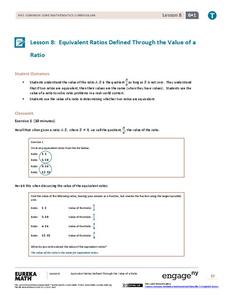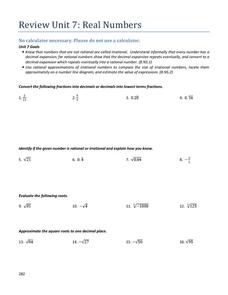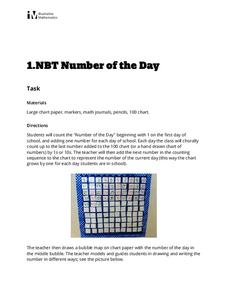EngageNY
Summarizing Bivariate Categorical Data with Relative Frequencies
It is hard to determine whether there is a relationship with the categorical data, because the numbers are so different. Working with a familiar two-way table on super powers, the class determines relative frequencies for each...
Fluence Learning
Writing an Opinion: Student Council
A three-part assessment challenges scholars to write opinion essays covering the topic of the student council. After reading three passages, writers complete a chart, work with peers to complete a mini-research project, answer...
EngageNY
Conditional Relative Frequencies and Association
It is all relative, or is it all conditional? Using an exploration method, the class determines whether there is an association between gender and superpower wish through the use of calculating conditional relative frequencies. The...
EngageNY
Comparison Shopping—Unit Price and Related Measurement Conversions
Speed up your scholars' understanding of ratios. Class members compare ratios related with speeds presented in different representations. They then use the unit rates to make the comparisons.
Illustrative Mathematics
Christina's Candies
Help Christina figure out how many chocolate and lemon candies she has with a lesson on decomposing numbers. When presenting this context to the class, the teacher chooses the total number of candies and the number that are chocolate,...
Curated OER
End-of-Year Practice Test (Grade 5 ELA/Literacy)
The end of the year has arrived, which means it's time to find out exactly what your fifth graders have learned over the past few months. With the help of this Common Core-designed assessment that includes two narrative passages and...
Fluence Learning
Writing an Argument: Persuasive Speeches to Students
Powerful orators make their messages compelling with a combination of factors. Learn how to be an inspirational speaker with a reading assessment activity that presents a list of persuasive speaking techniques, as well as two...
EngageNY
Describing a Distribution Displayed in a Histogram
The shape of the histogram is also relative. Learners calculate relative frequencies from frequency tables and create relative frequency histograms. The scholars compare the histograms made from frequencies to those made from relative...
EngageNY
The Difference Between Theoretical Probabilities and Estimated Probabilities
Flip a coin to determine whether the probability of heads is one-half. Pupils use simulated data to find the experimental probability of flipping a coin. Participants compare the long run relative frequency with the known theoretical...
EngageNY
Fundamental Theorem of Similarity (FTS)
How do dilated line segments relate? Lead the class in an activity to determine the relationship between line segments and their dilated images. In the fourth section in a unit of 16, pupils discover the dilated line...
EngageNY
Equivalent Ratios Defined Through the Value of a Ratio
Ratios may not be created equal, but they are equivalent. Pupils learn the theorem relating equivalent ratios and equal values in the eighth segment in a series of 29. Classmates use the theorem to determine whether ratios within...
EngageNY
Discovering the Geometric Effect of Complex Multiplication
Does complex number multiplication have the class spinning? Here's a resource that helps pupils explore and discover the geometric effect of multiplying complex numbers. In the 14th installment in the 32-part unit groups look at the unit...
Curated OER
The Class Trip
Mrs. Moore's class is trying to earn money for a trip to the science museum, but how much more do they need? Solve this problem with your own class as they develop their ability to model real-life situations algebraically. As an added...
EngageNY
Comparison Shopping—Unit Price and Related Measurement Conversions II
Which rate is greater and by how much? Pupils continue to compare rates to solve problems in the 20th portion of a 29-part series. Rates are presented in a variety of representations either using the same representation or different...
College Board
Reading—Synthesis and Paired Passages
Good readers make connections between texts. The SAT regularly assesses the ability to make those connections using paired reading passages, a topic discussed in an official SAT practice lesson plan on synthesis. During the lesson,...
Virginia Department of Education
Lines and Angles
Explore angle relationships associated with transversals. Pupils construct parallel lines with a transversal and find the measures of the angles formed. They figure out how the different angles are related before constructing...
Illustrative Mathematics
Field Day Scarcity
Introduce young mathematicians to concepts of financial literacy with this open-ended word problem. With seven dollars to spend during field day and given a list of available items and their prices, children must determine how they want...
Charleston School District
Pre-Test Unit 4: Linear Funcitons
Let your classes show you what they know! Use this pre-test to assess the current knowledge of your learners. The assessment includes all pre-algebra concepts related to functions: writing and graphing linear relationships, comparing...
Charleston School District
Review Unit 7: Real Numbers
Provide pupils with problems to check their understanding of the concepts within the unit. The seven-part series of lessons covers concepts related to irrational numbers. Learners convert between fractions and decimals, estimate the...
Inside Mathematics
Quadratic (2009)
Functions require an input in order to get an output, which explains why the answer always has at least two parts. After only three multi-part questions, the teacher can analyze pupils' strengths and weaknesses when it comes to...
California Education Partners
My Librarian is a Camel
A two-part assessment challenges scholars to gather information from reading then write an opinion piece. In part one, learners read, take notes, and answer text-related questions. In part two, participants use their new-found knowledge...
Illustrative Mathematics
Number of the Day
Daily routines not only help to manage classrooms, they can also provide students with rich opportunities for learning. This activity supports young learners in developing their number sense by counting up the school days on a class...
Curated OER
Parabolas and Inverse Functions
Your Algebra learners will explore what equations are functions or not functions and how to alter the domain to produce a possibility for the relations being a function with a limitted domain.
Curated OER
Which is Closer to 1?
A seemingly simple question that reveals a lot about a student's understanding of fractions. In finding an answer, learners compare fractions with different denominators that are both greater and less than one. No number line is...























